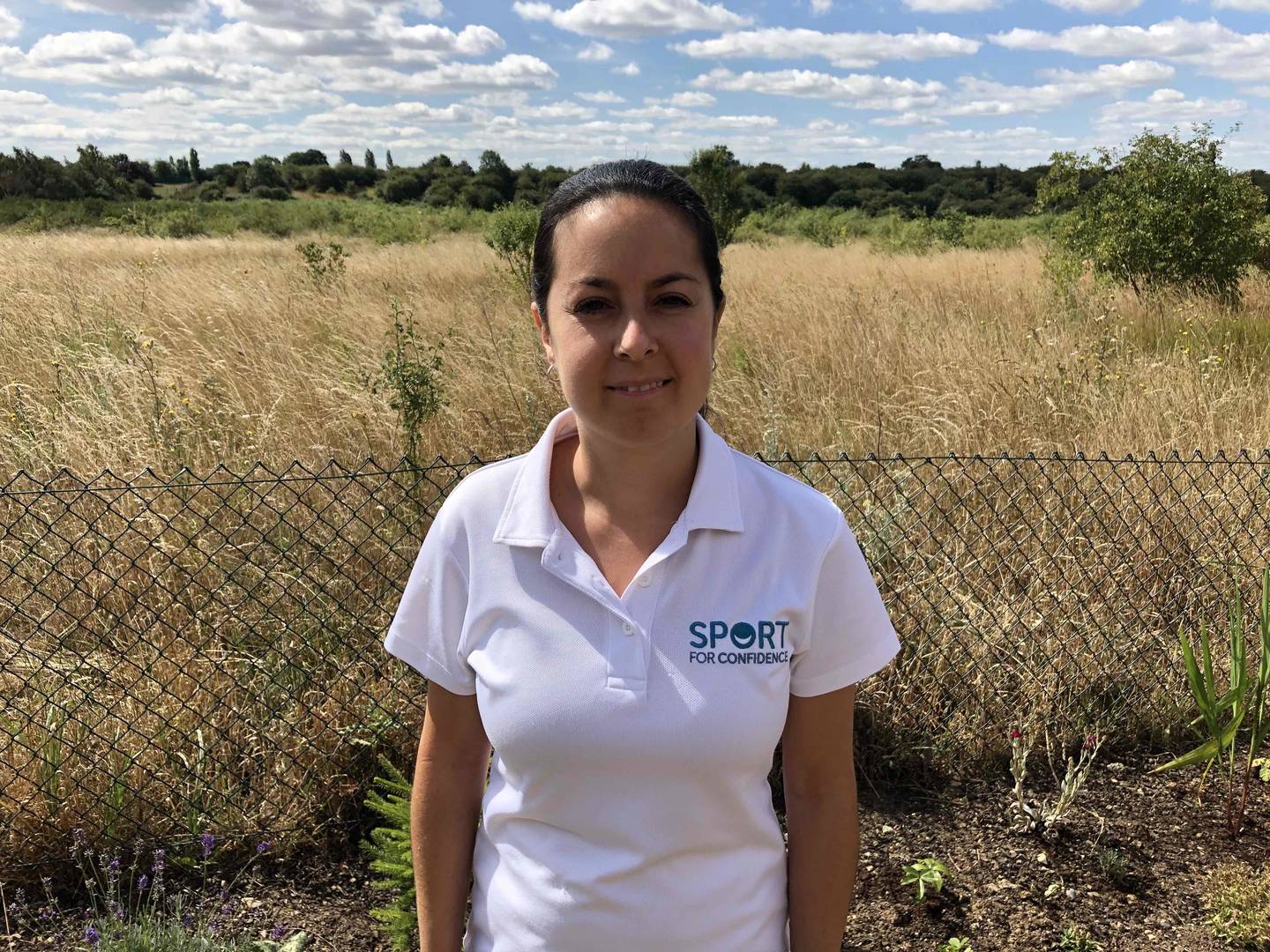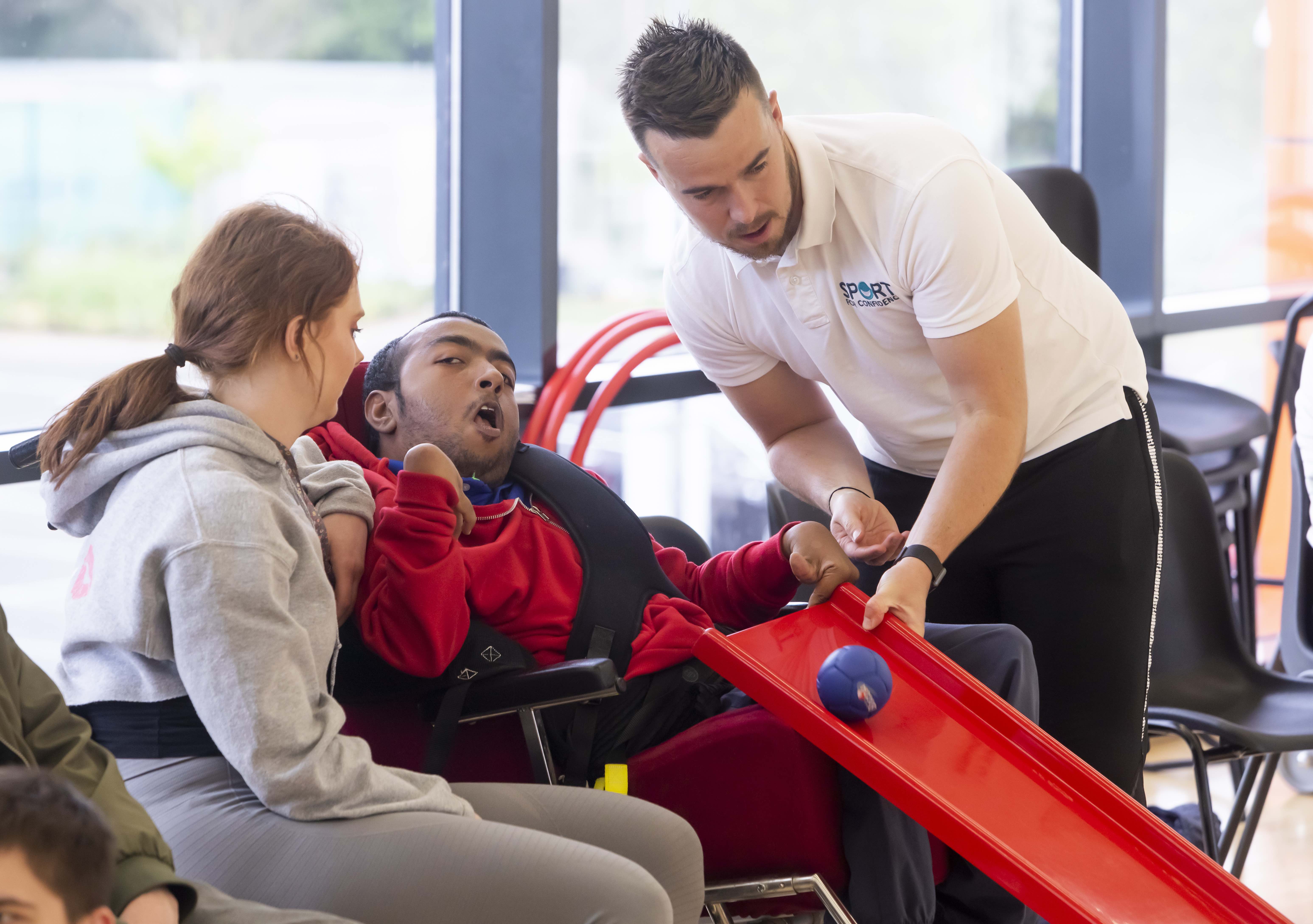Blog: “I’m looking forward to supporting clients face-face.”
Our latest monthly blogs explore how organisations and disabled people have returned to play. Our next blog comes from Lucy Goldup, Sport for Confidence occupational therapist. She tells about some of the challenges faced by occupational therapists in keeping their clients active through the Government’s social isolation strategy. And now, the challenges in supporting clients to return to leisure centres under the new social distancing normal.

Lucy's blog
Hi, I’m Lucy, occupational therapist at Sport for Confidence in South Essex. I support a vast diversity of clients. This includes people with learning disabilities and/or autism, people living with dementia, degenerative neurological conditions and other long-term health conditions. I also support individuals with cerebral palsy, ADHD, acquired brain injury, plus stroke survivors and individuals with mental health problems and enduring mental illness.
Let me tell you a little bit about Sport for Confidence. We are a unique and innovative organisation which uses occupational therapists and sports coaches to deliver physical activity-based interventions to vulnerable adults and marginalised groups.
As a result of the Government’s social-isolation strategy, Sport for Confidence re-deployed its entire staff team of occupational therapists and sports coaches to deliver a specialist ‘at home’ service. This provided support to at risk adults across Essex who had to self -isolation due to the impact of the pandemic.
Throughout lockdown, our team of occupational therapists provided a highly personalised telephone support service to vulnerable adults across the county, as part of our Stay Connected programme. Topics of conversations with clients included;
- how to establish a daily routine,
- the importance of self-care, healthy eating, rest and physical activity,
- goal setting,
- taking part in meaningful activities at home
- and alternative ways to engage with family and friends.
During the first three months, we delivered more than 3,100 telephone interventions to 876 adults across the county.
Our Stay Connected programme was originally funded to run from the start of April 2020 until the end of July 2020. Due to its success, Essex County Council extended funding to enable support to continue until the end of September 2020, when we hope to be able to resume our more traditional face to face support services.
Our team of specialist sports coaches delivered more than 1,000 physical activity sessions too. Some sessions have been delivered direct to individuals reflecting bespoke abilities and activity preferences. Whilst others have encouraged multiple participants to join group sessions via a schedule of weekly Zoom sessions, encouraging interaction.
Stay Connected has enabled us to maintain professional contact with individuals who could otherwise really struggle both mentally and physically with the negative effects of isolation. Keeping clients active and connected remotely is not perfect but it has provided a lifeline to many until we are able to resume our usual services.
“Being a part of the Stay Connected service has been very good. Through this service I have been given a carephone which has let me keep in contact with my friends, family, and my physiotherapist during lockdown. The phone has also let me take part in the Sport for Confidence Zoom chair exercise sessions and the sports quiz, which is great fun. I do not have the internet, so the phone has been brilliant. I have missed going out and seeing my friends. I am looking forward to going out again and going back to the Sport for Confidence swimming.” Stay Connected Participant
The biggest challenge during the pandemic has been in maintaining motivation levels in order to ensure clients kept active. The Stay Connected programme was designed to help clients and their families adapt to change, maintain professional support and maintain a sense of community and belonging.
With more sport and activity now resuming, the main challenge our clients face will be adjusting to change in what has now become a new, established routine. For many, simply stepping back through the doors of the leisure centre will be a huge challenge. A return to familiar surroundings after so long away could cause anxiety and confusion. Add to this the new changes leisure centre operators will be required to impose in order to limit the spread of the virus. Such as social distancing measures, changes to the way visitors ‘flow’ around the centre and new signage, and suddenly the environment becomes even less familiar. A situation which for many could be completely over-whelming.
Pre-Covid, many of our clients enjoyed social interaction which extended beyond the physical activity session into the café. This interaction was incredibly valuable to many, helping to promote new opportunities to engage with others and develop a range of social skills. The loss of this service will be devastating for many who, outside of our sessions lead very isolated and lonely lives.
Other challenges include that it is likely the leisure centres will introduce non-contact, procedures such as online booking and cashless systems. Many of our clients do not own a bank card and may have difficulty using an online booking system. Our aim is to work with our leisure centre partners to explore ways we can best support our clients and help them to adapt. Carers will also play a vital role (paid and/or family members) in this reintegration process.

To support our clients to adjust to this new normal, we’ve created and shared video walkthroughs. This details changes in procedures and each client will be offered a guided tour of the leisure centre they are used to attending. New Covid-19 health and safety procedures will be fully explained too. Our sports coaches will also continue to provide physical activity sessions via Zoom, recorded at the leisure centre, to help clients reconnect with the environment before they physically attend.
There is positivity in returning as it will provide our clients with the opportunity to take part in sport and physical activity again outside of their home environment - using sport as a vehicle for intervention. Structured physical activity sessions delivered in a community setting and supported by occupational therapy treatment and assessment has been proven to promote life changing outcomes. This positively impacts daily lives. Whilst Stay Connected has played a vital role, there is no substitute for face to face, physical intervention. I’m really looking forward to being back in the leisure centre and supporting clients face-face.
My advice to other occupational therapists working on encouraging their disabled clients, or clients with long-term health conditions back to original activities is - use our skills to grade and adapt how we support clients back to their original activities. At Sport for Confidence we are offering a phased return to the leisure centre with small group sessions one-to-one sessions.
One of our core skills is therapeutic use of self, which is a technique we use to engage clients in the occupational therapy process. This will play an important role when supporting clients back to their original activities and help them feel comfortable and supported. Setting short term, realistic goals, as well as looking at what is meaningful to the clients, will also be important.
Support on staying active
At Activity Alliance we are striving to achieve fairness for disabled people in sport and activity. Working together with members and partners, we want to close the gap between disabled people’s level of inactivity and that of non-disabled people.
We are committed to ensuring disabled people can be active and stay active. Before the pandemic, we were making good progress on closing the unjust gap between disabled and non-disabled people’s activity levels. However, as we went into lockdown, we witnessed the highest number recorded for disabled people’s activity levels yet. Now additional hurdles need addressing that affect millions of people across our country.
As the sport and activity sector continues adjust to a new normal, there are lots of ways to continue to stay active. If you are not as active as you would like to be or you know someone who isn't we have complied a list to support you to be active at home. Visit our Get Active at Home page to find a list of exercise advice, workouts, videos, and activity guides for disabled people. For general advice about becoming active, visit our Get Active page.